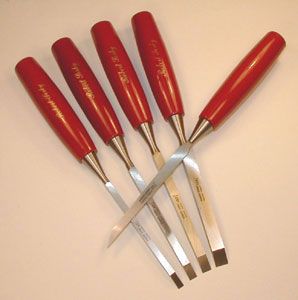
Sash Mortise Chisel: Medium length mortise chisel for bench use, generally with unhooped handles. “Sash” comes from window factories, and there is some confusion describing medium length and long length mortise chisels as factories generally used the longer chisels but the medium ones are often called “sash” chisels.

German Pattern Mortise Chisel: My term for them as they don’t fit other descriptors. Heavy, untapered blades and hooped, tang handles.

Millwright or Factory Mortise Chisel: Very long, very heavy mortise chisel designed for heavy striking with heavy, hooped handles. Many were 16” long and often made by manufacturers like New Haven Edge Tool who specialized in large chisels. Always with hooped, socket handles.

Slick: A large, very heavy 2-4” framing chisel with long handle up to 24” designed for paring large timbers with 20-25 degree bevels. Never struck. Always with socket handles. These and the heavier framing chisels are dangerous and should have protective edge covers made.
Buying old chisels, you can expect to see many combinations, as handles are interchangeable and chisels are often converted to other uses as they wear. The butt socket chisel in the top left picture was originally a well-worn DR Barton firmer I converted, and the skew parers below were originally socket bench chisels of many flavors:

From my observations in buying up lots of cast-off chisels to make up sets, anything marked "Stanley", "Witherby", "Winchester", "Chas Buck" or "White" is going to a collector for too high a price....along with some Swan's. Greenlee, older (not newer) Buck, New Haven Edge, Ohio Tool, DR Barton, Underhill, Union Hardware, GI Mix, Shapleigh Hardware, Eric Anton Berg, Dickerson, Gillespie, Dixon, PS&W or PEXTO, Robt Duke, Merrill, Butcher, Hibbard OVB, Simmons Keen Kutter, Lakeside and several other old makers are every bit as good as the collector prizes and are much less expensive. Most unmarked chisels of that era were usually made by one of the above makers and are also generally excellent.
The only really poor socket chisels I've observed buying are newer Craftsman (older socket Craftsman were made by Greenlee) of too-thick, modern, gummy, shiny chrome-vandalium steel...and some "Eclipse" brand and Stanley Defiance that won't take an edge.
The bad news in making up sets for yourself is that used tool dealers rarely understand any of the above and you have to look at each and every listing in detail. The good news is because of that ignorance and the minimum number of name brands collected, all of the others, including many of the rarer types are dirt cheap.
Pictures other than mine are from Harry Miller, Lee Valley and Highland Hardware.
““Perhaps then, you will say, ‘But where can one have a boat like that built today?’ And I will tell you that there are still some honest men who can sharpen a saw, plane, or adze...men (who) live and work in out of the way places, but that is lucky, for they can acquire materials for one third of city prices. Best, some of these gentlemen’s boatshops are in places where nothing but the occasional honk of a wild goose will distract them from their work.” -- L Francis Herreshoff












 Reply With Quote
Reply With Quote